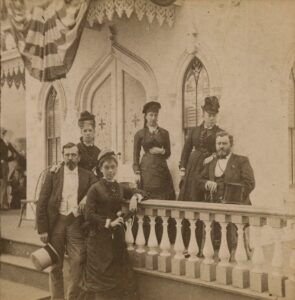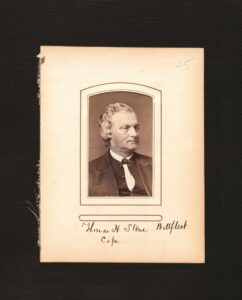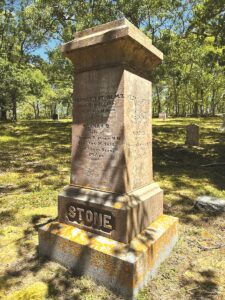On Friday morning, Aug. 28, 1874, the cars of the Old Colony Railroad, which had extended service to the tip of Cape Cod the previous July, began an excursion down Cape from Hyannis, passing through Yarmouth, Harwich, and Eastham, where cheering crowds assembled at the depots hoping for a glimpse of one passenger in particular. When the train pulled into the Wellfleet depot, President Ulysses S. Grant stepped out onto a platform to greet the enthusiastic throng.
When he did so, it was the first time, noted the New York Daily Herald, that the “sands of the Cape were ever trod by genuine presidential footsteps.”

Escorting President Grant to the platform and welcoming him heartily was one of Wellfleet’s most respected citizens, Dr. Thomas Newcomb Stone, who at the time was serving in the state legislature.
After three cheers had been shouted in the president’s honor, Dr. Stone proposed that three more be raised for Mrs. Grant and then an additional three for the Grants’ daughter Nellie, who was living in England. Stone noted that Wellfleet was “hard by the ocean whose waves wash the shores of the old world; we may therefore feel that we are very near the mother country,” words that reportedly touched the heart of Mrs. Grant.
After the introduction of numerous dignitaries, the brief reception concluded, and the presidential train resumed its journey, arriving in Provincetown near dinnertime before returning to Woods Hole that evening.
Born in Wellfleet in 1818 to Dr. William Stone Jr. and Hannah (Doane) Townsend, the widow of local doctor James Townsend, Thomas Newcomb Stone was the second of the couple’s eight children. Dr. William Stone Jr. (1783-1844), who had studied medicine with his father in Enfield, Conn., practiced in Wellfleet for 30 years before retiring to a farm in Harvard.

Thomas Newcomb Stone had gone to Bowdoin College with plans to become a Congregational minister. But he changed the focus of his studies to medicine before graduating in 1840 and received a medical degree from Dartmouth College in 1844, becoming the third generation of Stone physicians. He established a large general practice that extended from Eastham to Provincetown.
Thomas Stone’s first marriage was to Hannah Atwood, with whom he had two sons, and after her death in 1853, he married Hannah’s sister, Nancy Beals Atwood, with whom he had two daughters.
Thomas and Hannah’s son William Newcomb Stone, born in 1845, continued the family legacy, graduating from Harvard Medical School in 1869. He joined his father’s practice in Wellfleet, where he continued until his death in 1898. Thus, for nearly 90 years, Wellfleet was served by a doctor named Stone.
William Newcomb Stone married Adeline Hamblen, and their son, a second Thomas Newcomb Stone, named after his grandfather, also became a physician. He earned his medical degree at Harvard in 1904 and practiced in Haverhill but spent summers in Wellfleet. His death in 1943 ended a remarkable line of five successive generations of Stone doctors.
Despite his busy practice, the Thomas Newcomb Stone who greeted President Grant took a keen interest in education and served for more than 30 years on the Wellfleet School Committee. He also assisted in the opening of Wellfleet’s first public library. A staunch advocate of temperance and a pew holder at the Congregational Church, Dr. Stone was a popular speaker at community events for which he often composed rhymes. He did not refer to them as poems.
Dr. Stone published a volume of his rhymes in 1869. It captures moments of life here, informed by his work and his search for spiritual understanding. He dedicated the book, Cape Cod Rhymes, “To those sons and daughters of Cape Cod, who in every state of our broad land, and on every sea of our broader earth, maintain her honor, and own her as mother.”

In his introduction, he noted that his rhymes “have been written in the few short intervals of labor allowed to a physician. They are the children of occasion and circumstance, to whom I stand godfather.”
He was modest about his poems: “To the lovers of Cape Cod I commend them, as rude songs that may awaken in them sweeter memories than ever yet found utterance.” Perhaps no sweeter memory was awakened for the good doctor than the memory of his six-year-old son who died in 1857, memorialized in the rhyme, “When Tommy Died.”
Not long after the visit by President Grant, Dr. Stone moved to Provincetown, then in dire need of a physician. He did not live there long. Stone contracted pneumonia and died on May 15, 1876. Brought home to Wellfleet, he was buried in Oakdale Cemetery, which was at that time the Congregational cemetery.
Dr. Stone’s Cape Cod Rhymes can be downloaded from the web page archive.org/details/capecodrhymes00ston.



